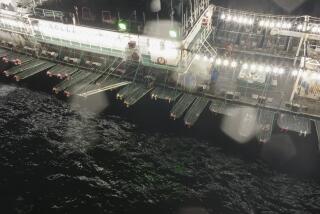Indonesians Risk Jail to Poach Prized Trochus Shell
- Share via
SYDNEY, Australia — La Elo, an Indonesian fisherman from the tiny Sulawesi island of Maginti, first turned up as an illegal fisherman in Australia’s northern waters just over three years ago.
He was a crewman on board the frail fishing boat, the Merpati, which was sighted off Australia’s northwest coast with a cargo of valuable trochus shells.
La Elo was apprehended by fisheries officials, told not to return and sent back to Indonesia on a flight paid for by the Australian government.
He was back again the following year making the risky 800-mile journey from his home as a crewman on the Soepe Soepe II.
This time he was charged and released on a two-year bond. Once again he had a free flight home after being told by the magistrate in the northwest fishing port of Broome never to return.
He did. In May, 1990, La Elo, now a captain, was arrested and jailed for 120 days for breaching his bond. He was back for a fourth time in July this year and is now in jail again, this time for 240 days.
La Elo, 29, like most of the trochus poachers arrested and jailed from islands in southeast Sulawesi, says he cannot make a living back home.
“He’ll probably turn up for a fifth time, “ said one fisheries department official in Broome. “They all say it’s their only livelihood and they’re willing to take the risk.”
The dangers and hardship on the monthlong voyage are great, but the rewards for those who evade Australia’s Coastwatch planes and patrol vessels make it worthwhile.
The reef-living trochus shells are bought by Indonesian middlemen and sold abroad for making buttons and fashion jewelry. Crushed shell provides the high-gloss sheen in nail polish and paint for luxury cars.
The marine mollusk, which reaches a maximum shell diameter of 6 inches, fetches up to $3 a pound. The fishing boats can carry an average of a ton, worth up to $6,000.
In the last three years, Australian patrol boats have arrested 150 Indonesian vessels for fishing inside the Australian fishing zone--more than a third of them for taking the prized trochus shell.
In most cases, the motorized wooden boats and their equipment are burned in an attempt to stop the fishermen from returning.
“They would never conform to Australian safety standards anyway,” said Western Australian Fisheries Department official Mick Flanagan.
But burning the boats has not worked and despite the recent imposition of jail sentences for the crew as well as the captain, the illegal fishermen keep coming.
“You have to realize that if only one in five of the vessels gets back undetected, it’s economical,” said Bruce Miller of the Australian Foreign Affairs Department.
Most boats are crewed by village collectives with funds contributed or borrowed to buy and equip them for the voyage to Australian waters.
Australia’s diplomats in Indonesia have been to Sulawesi in the last few years to talk to villagers about the illegal fishing and to explain a bilateral agreement under which so-called traditional fishermen have access to trochus shells.
A Memorandum of Understanding signed in 1974 allowed trochus shells to be gathered in Australian waters around a specific reef by fishermen using sailing boats without a motor and non-motorized trawl methods.
Australia’s campaign to stop the poaching inside its 200-nautical mile fishing zone has cost millions of dollars.
Keeping those arrested in a fairly comfortable holding area while awaiting trial or repatriation does not necessarily help as a deterrent.
A daily allowance and free flight back to Indonesia has helped promote the cycle of offenders and angered Australians, particularly in places like Broome, who believe those guilty of plundering the country’s resources have been treated far too sympathetically.
“It seems to me that this one-way tourist traffic by courtesy of the Australian taxpayer will have to stop,” Broome magistrate Ken Moore said after sending 43 men to jail for periods of 40 days to one year.
More to Read
Sign up for Essential California
The most important California stories and recommendations in your inbox every morning.
You may occasionally receive promotional content from the Los Angeles Times.













